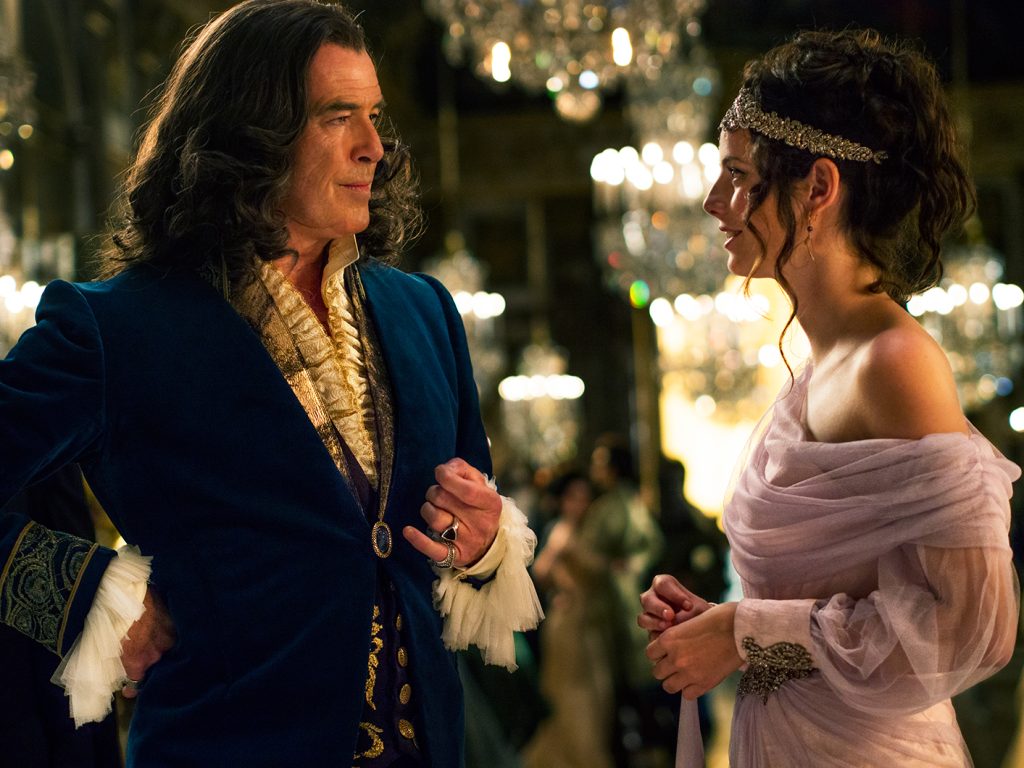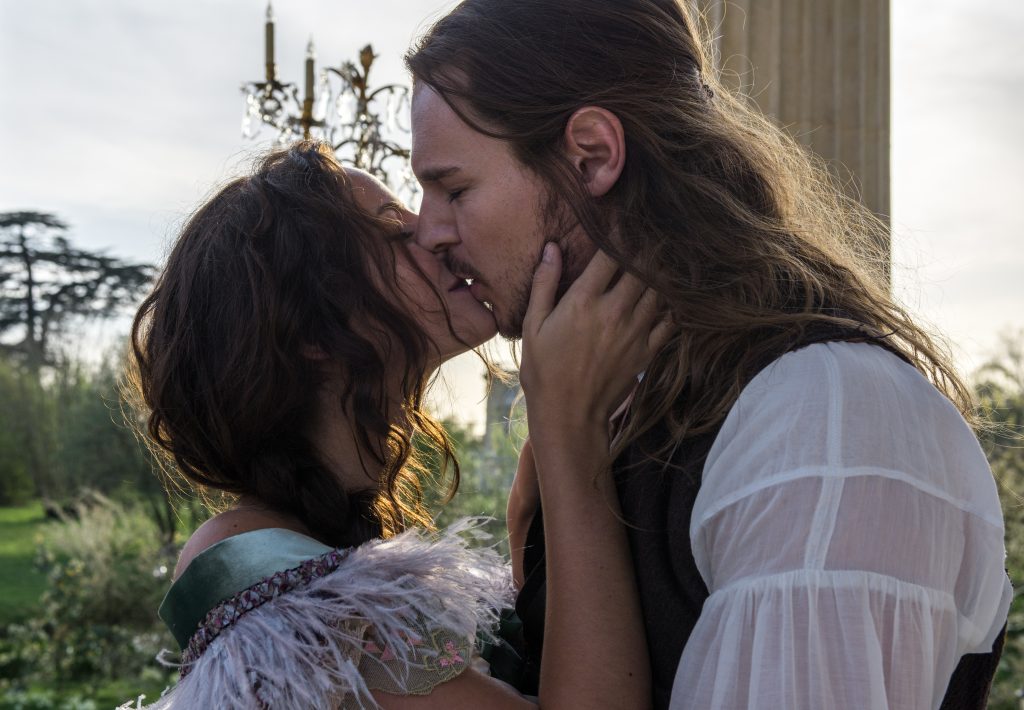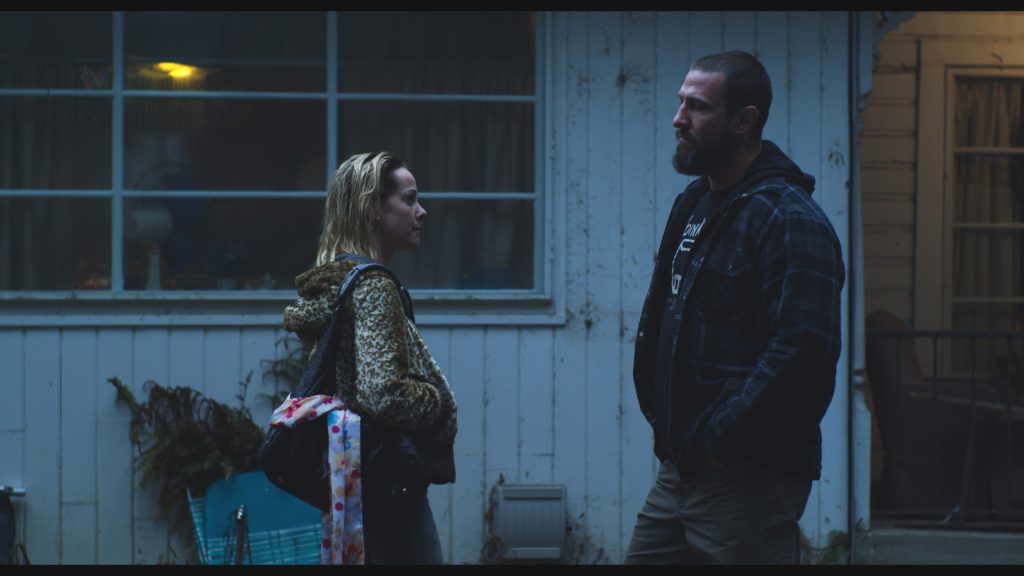January 22, 2022
by Carla Hay

Directed by Sean McNamara
Culture Representation: Taking place in 1684 in Versailles, France, the fantasy drama film “The King’s Daughter” features a nearly all-white cast of characters (with a few black people and Asians) representing the working-class, middle-class and royalty.
Culture Clash: King Louis XIV wants to get immortality by taking the life force from a magical mermaid, but the king’s rebellious daughter Marie-Josèphe does everything she can to prevent this mermaid’s death.
Culture Audience: “The King’s Daughter” will appeal primarily to people who like watching tacky and poorly made fairy-tale movies.

“The King’s Daughter” is a laughably bad movie that seems like a parody, but with no self-awareness about how truly awful it is. It’s a fantasy drama filled with hokey dialogue, cheesy visual effects, and high-society women in 1680s France who dress like 1980s prom queens. Some of the scenery and production design are nice to look at (parts of the movie were filmed at the Palace of Versailles), but everything else is so bottom-of-the-barrel predictable and corny, it’s an embarrassment to everyone involved in making this horrendous flop.
Directed by Sean McNamara, “The King’s Daughter” is adapted from Vonda N. McIntyre’s 1997 novel “The Moon and the Sun,” which was a combination of science fiction and historical romance. Barry Berman and James Schamus adapted the novel for “The King’s Daughter” screenplay, by hacking up “The Moon and the Sun” and turning it into a screenplay equivalent of a cheap and vapid romance novel. “The King’s Daughter” takes place in 1684 in Versailles, France, but the movie looks like the filmmakers just wanted to stick the movie in a palace setting, hire some well-known actors, and then hope the audience doesn’t notice how phony everything looks. “The King’s Daughter,” which was originally titled “The Moon and the Sun,” was filmed in 2014, and went through several studio ownerships before being released in 2022. It’s easy to see why multiple movie studios didn’t want to release this movie for all of these years.
The makeup and costume design in “The King’s Daughter” can best be described as careless, with too many modern details that make the movie look confused about the century in which this story is supposed to take place. Things aren’t much better with how “The King’s Daughter” has wildly uneven acting that ranges from campy to bored. Maybe it’s because the dialogue that the cast members have to work with is so cringeworthy. Somehow, the filmmakers convinced Oscar-winning actress Julie Andrews to do some voiceover narration for “The King’s Daughter.” Someone should’ve told Andrews that this atrocious movie makes “The Princess Diaries” look like an Oscar-worthy masterpiece in comparison.
“The King’s Daughter” has a muddled story about King Louis XIV (played by Pierce Brosnan, hamming it up in a long-haired wig) wanting to live forever, because he’s so egotistical that he thinks France will go downhill if he dies. “My immortality secures the future of France!” King Louis XIV pompously declares. King Louis XIV, who is also called the Sun King, feels more urgency to find the secret to immortality after he survives a botched assassination attempt upon his victorious return from a war. This assassination scene is sloppily acted: The king gets shot on the side of his abdomen, but then he’s able to get up, as if he just has a slight bruise.
The king’s personal physician Dr. Labarth (played by Pablo Schreiber) tells him that in the underwater Lost City of Atlantis, there’s a fabled female sea creature that could hold the secret to immortality. In order for the immortality magic to work, the creature’s life force can only be taken when the sun meets the moon—in other words, a solar eclipse. The king’s other close advisor is a priest named Père La Chaise (played by a William Hurt), who thinks it’s a bad idea to try to mess with nature and matters of life and death. The priest’s warning doesn’t stop the king from ordering a ship of naval subordinates to find this sea creature in Atlantis.
Captain Yves De La Croix (played by Benjamin Walker) is the ship’s leader. It doesn’t take long for Yves and his men to find two mysterious sea creatures and capture them. The creatures are a mermaid (played by Fan Bingbing, also known as Binging Fan) and a merman, who are a couple with an infant child. The merman is let go, but the mermaid (who’s never given a name) is brought back to an underground grotto area at the king’s palace. Later, it’s shown that the mermaid quickly gave the infant to another mermaid for safekeeping when she saw her male partner being captured and she knew she would be next.
Meanwhile, the beginning of “The King’s Daughter” shows a feisty young woman named Marie-Josèphe (played by Kaya Scodelario), who has grown up in a convent by the sea, being scolded by some nuns for Marie-Josèphe’s penchant of wanting to swim in the sea. Rachel Griffiths has a cameo as the convent’s head abbess. Marie-Josèphe’s unnamed mother (played by Tiffany Hofstetter, in a flashback) died when she was a baby. Marie-Josèphe’s father is King Louis XIV, who knows about Marie-Josèphe, but he never claimed her because she’s an illegitimate child.
Marie-Josèphe has grown up not knowing who her father is, but she’s about to find out. Faster than you can say “stupid fairy-tale movie,” Marie-Josèphe is summoned to the palace by the king, who has no other children and is thinking about his legacy in case he can’t live forever. Eventually, Marie-Josèphe finds out that the king is her father, but he orders her not to tell anyone that he’s her father. The movie tries in overly contrived ways to make Marie-Josephe look like a “relatable princess.” For example, Marie-Josephe clumsily falls in a fountain outside of the palace the first time that she meets the king.
The big conflict in the story comes when Marie-Josèphe finds out about the captured mermaid and wants to free the mermaid from captivity, against the king’s wishes. “The King’s Daughter” awkwardly wastes a lot of time getting to this big conflict. After Marie-Josèphe discovers the captured mermaid in the grotto and starts to befriend her, Marie-Josèphe suddenly gets the urge to play the cello. The music that Marie-Josephe plays is the music she can hear the mermaid communicate. Yes, it’s that kind of movie.
When she’s not playing in a string orchestra on the palace lawn, as if she’s some kind of wedding performer, Marie-Josèphe is secretly visiting the mermaid. The strange moaning and shrieks that come out of the mermaid’s mouth can only be described as sounding like a mutation of a whale and a dolphin. The mediocre visual effects for the mermaid are often obscured by the water. The mermaid also glows in the dark.
Marie-Josèphe also hangs out with her lady-in-waiting Magali (played by Crystal Clarke), who is kind of an airhead. This is what Magali says to Marie-Josèphe when Magali finds out that she and Marie-Josèphe both grew up without their biological parents: “Trauma at the start of life often inspires greatness.” The casting of Magali is racially problematic because she is the only black person with a speaking role in the movie—and she’s a servant character who’s essentially a “mammy” stereotype seen in outdated and racist movies.
The movie’s grossly inaccurate fashions are random and very distracting. The society women and men of the king’s court sneer at Marie-Josèphe when she first arrives at the palace, because she’s dressed like a peasant. But some of the women are styled to look like Goths who got rejected from a Siouxie and the Banshees music video from the 1980s.
The fashion mistakes don’t stop there. Marie-Josèphe starts to dress more like a princess, but her gowns are the types of dresses that high school girls in 1980s teen romantic comedies would wear in scenes for proms or homecoming dances. Magali sometimes wears a plastic headband that looks like it was bought at a corner drugstore, not something that belongs to a lady-in-waiting in 1680s France. Yves sometimes wears a modern-styled leather jacket, as if he’s about to go on a motorcycle ride in a century when motorcycles weren’t even invented.
Every princess movie has a love story. In “The King’s Daughter,” Yves and Marie-Josèphe make goo-goo eyes at each other almost as soon as they meet, when he catches her hanging out in the grotto with the mermaid. Their courtship plays out exactly like you expect it would. Scodelario and Walker have some on-screen chemistry together (probably because they became a real-life couple because of this movie and got married in real life), but the romance in the movie is very dull.
Predictably, Yves is under orders from the king to keep the mermaid in captivity. Marie-Josèphe wants to set the mermaid free. As Yves and Marie-Josèphe fall in love, his loyalty is torn between King Louis XIV and Marie-Josèphe. You know how this is is going to end, so there’s no suspense.
Marie-Josèphe gets a serious injury on her right arm after falling off of a horse. Dr. Labarth recommends that her arm be amputated. But lo and behold, Marie-Josèphe goes down to the grotto to visit the mermaid, who heals Marie-Josèphe’s arm completely. It makes the king even more determined to steal the mermaid’s powers during the upcoming solar eclipse.
And because this movie is filled with clichés, there’s a love triangle. A haughty rich guy named Jean-Michel Lintillac (played by Ben Lloyd-Hughes) is making King Louis XIV feel guilty because Jean-Michel’s military father was killed in the war, and Jean-Michel blames the king. To get this complainer off of his back, the king offers Jean-Michel the title of duke. Later, the king arranges for Marie-Josèphe to marry Jean-Michel because the king doesn’t want Marie-Josèphe to be romantically involved with a commoner like Yves, who has some kind of past feud with Jean-Michel.
As the feisty and plucky Marie-Josèphe, Scodelario seems to give a sincere effort to embody her character, but her scenes with Brosnan are undercut by his campy over-the-top acting. Jean-Michel and Dr. Labarthe are just cardboard-like villains, although “Sons of Anarchy” alum Schreiber as Dr. Labarthe should be given some credit for playing a character outside of his usual “working-class tough guy” persona. Meanwhile, Oscar-winning actor Hurt (as Père La Chaise) looks embarrassed to be in this movie. Viewers who watch this train-wreck film might be embarrassed too at wasting their time with this junk.
Gravitas Ventures released “The King’s Daughter” in U.S. cinemas on January 21, 2022.


